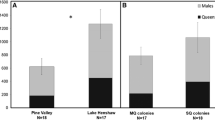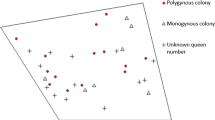Summary.
Cooperation between individuals can lead to both increased productivity and increased survival of colonies relative to solitary breeding. We investigated how individual survival, survival of the group and estimates of group productivity are related to colony size in the allodapine bee Exoneura nigrescens. Colony survival strongly depended on initial colony size, but such a correlation was not found for survival of individuals from colonies of different initial sizes. Loss of a female from two-female nests resulted in a decrease in the number of immatures reared through, but such nests still maintained a higher reproductive output than solitary nests. Group benefits have been underestimated in previous publications because changes in colony size and size dependent colony survival had not been taken into account. The relatively large group benefits measured in this study have implications for the expected skew.
Similar content being viewed by others
Author information
Authors and Affiliations
Additional information
Received 13 November 2000; revised 27 March and 30 July 2001; accepted 16 August 2001.
Rights and permissions
About this article
Cite this article
Hogendoorn, K., Zammit, J. Benefits of cooperative breeding through increased colony survival in an allodapine bee. Insectes soc. 48, 392–397 (2001). https://doi.org/10.1007/PL00001796
Issue Date:
DOI: https://doi.org/10.1007/PL00001796




